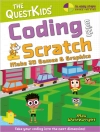Dreamweaver is Macromedia’s bestselling web design/development environment. Dreamweaver has the capability to generate dynamic website code using server-side languages like ASP, PHP, and ASP.NET. We know that you don’t always require a full database-driven site though, so this book focuses on using version 8 of Dreamweaver to design and create usable, standards-compliant websites using XHTML and CSS. One of the highlights of this version is much closer, tighter CSS/XHTML. This book will show you how to make the most of that feature.
After a brief introduction to the latest version of Dreamweaver, and how CSS and XHTML fit into it, Craig Grannell looks at using the software for your web design projects in a hands-on, task based manner.
Innehållsförteckning
i. To C ii. [Preface] About the author About the technical reviewer(s) Acknowledgements Introduction 1. A new kind of web design About the internet The history of web design Why create a website? Introducing web standards XHTML CSS The cascade 2. Getting started with Dreamweaver General interface (show OS X and Windows) New documents Built-in stuff XHTML compliant checkbox Main window Code view Code hints Split view Design view Tabs (Win only) Other toolbar buttons Head section content Footer content Contextual menus Insert panel Properties inspector Right-hand panels section Important preferences Accessibility CSS defs Browser set-ups 3. Setting up a website Manage sites dialog (go straight for advanced version) Files panel (maximised and minimised) Site structure (assets, etc) Uploading/downloading files File management (moving, renaming, deletion) 4. Website essentials Web page element overview Where each type of element will be covered in the book Dreamweaver defaults XHTML transitional DOCTYPE (explain alts + mention XML declaration) iso-8859-1 meta element (show alts) title Adding meta elements Attaching Java Script files Attaching CSS files Working with CSS CSS Style definition dialog box explained Page margins and padding Setting default fonts and colors Web page backgrounds HTML comments 5. Working with text Explaining semantic mark-up Creating paragraphs Creating headings Making text bold and italic Preformatted text Alignment (link to later—doing this directly in CSS with styles) Styling text (== element selectors) Avoiding inline styles (talk about the font/size/color options in the Properties panel) Using CSS (Type/Block section of CSS style definition) Creating a new style Font (tips on good webfonts) Weight Style Variant Line-height Case Decoration Color Word spacing Letter spacing Text-align Text-indent Using images (brief; refer to following chapter) Mac vs Windows comparison DW Design view limitations when using keywords and percentages Applying styles to multiple elements (== class selectors) Applying styles to inline elements (== spans) Examples/walkthroughts Contemporary Accessible Print-like Integrated images (backgrounds) Drop caps Pull quotes … Lists Creating lists Ordered Indents/outdents Management and editing Styling (List section of CSS Style Def box) Browser issues Inline lists 6. Working with images Exporting images from graphics packages JPEG GIF GIF89 PNG Inte
Om författaren
A bio is not available for this author.












